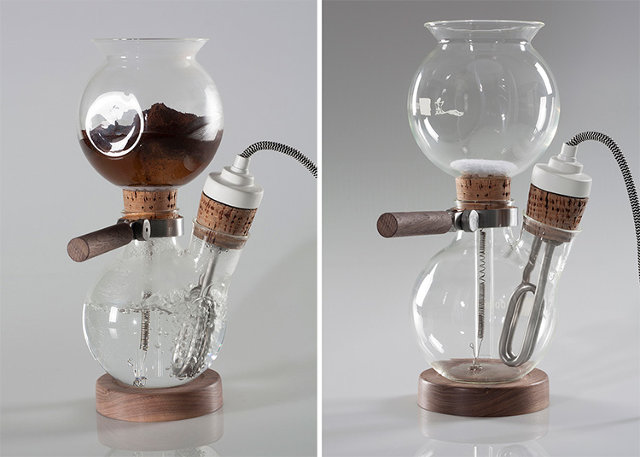Perhaps it's the late nights at the lab, or just the fact that the ubiquitous glassware is so well suited for double duty brewing up a cup of joe, but chemistry and coffee have always seemed to go hand in hand. The Café Balāo is a coffee machine that even Mendeleev (or Gale Boetticher) could have loved: a siphon-like coffeemaker that borrows its design cues not from Nespresso, but from the equipment of a science-age chemistry lab.
Designed by Portuguese design student Davide Mateus, the Café Balāo looks very much at first glance like a modified version of the Kipp Apparatus. There are two tiers of the Balāo, one for water and the other coffee, each of which is made with reinforced glass. Place ground coffee in the top bulb, and fill the bottom tier with water. A submerged electric coil heats up and boils the water when the Balāo is plugged in.

The way the Café Balāo brews coffee is simple percolation physics. When you plug in the Balāo, the heated coil in the bottom bulb begins to rapidly boil the water in which it is immersed. The boiling of water forces the water up the pipe in the middle of the Balāo, which then enters the chamber with the coffee, where it is infused. After it has boiled for however long you want it to boil, you unplug the Balāo. As the coffee cools, it flows back into the lower chamber, leaving the spent grinds in the top container.
According to Mateus, a master's student at the ESAD.CR design school in Caldas de Rainha, the Café Balāo's laboratory bowl setup results in a sweet, delicious cup of coffee every time, thanks to the glass construction and precise control over the length of the brew. Inspired by watching local chemists use a siphon coffee maker over a bunsen burner, Mateus set out to create a design that borrowed the mad scientist-like trappings of the siphon experience, but which did not require open flame or an external burner to make.
The Café Balāo is not available for sale yet, although Mateus's functional prototype is being adapted to industrial production. He is currently looking for partners to make a mass-produced Café Balāo a reality.